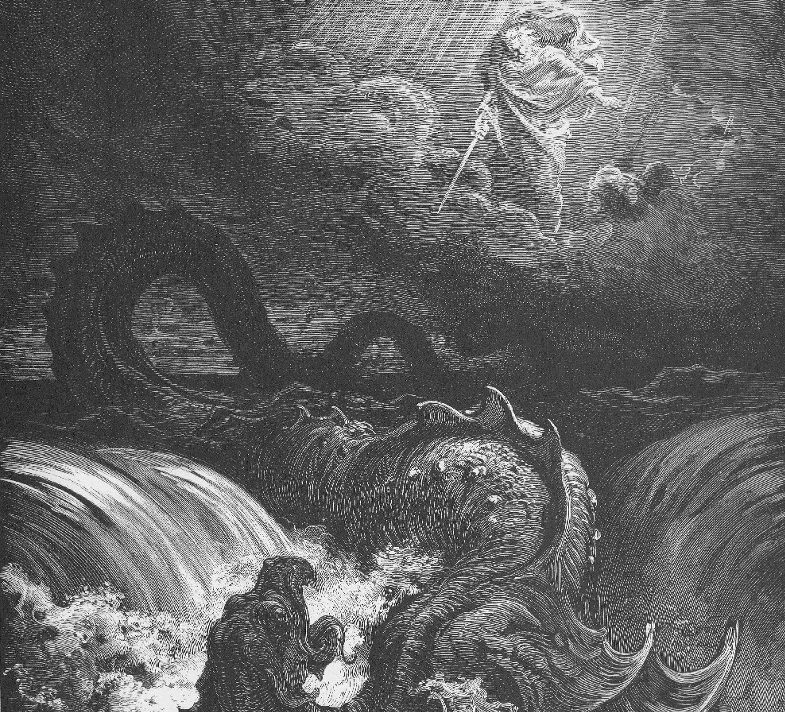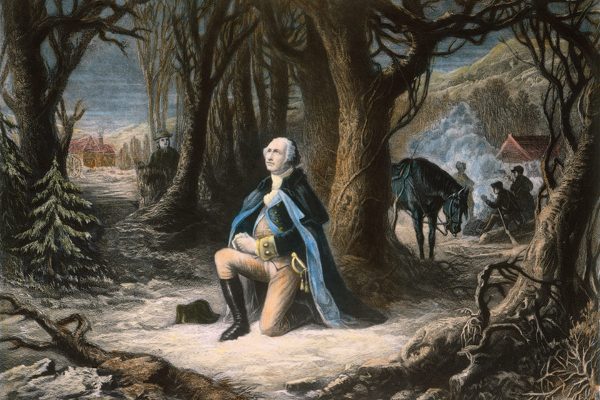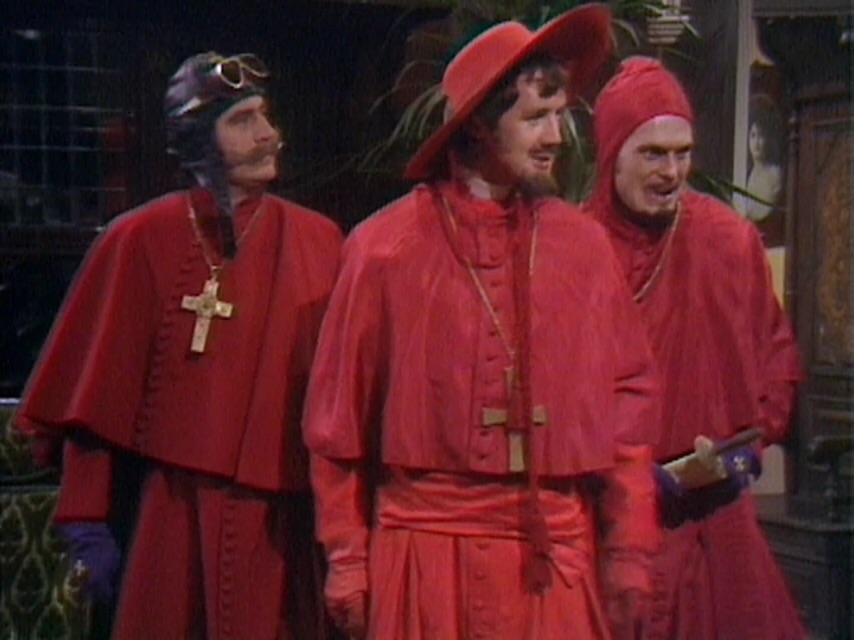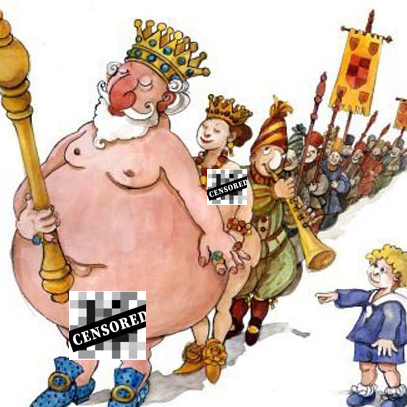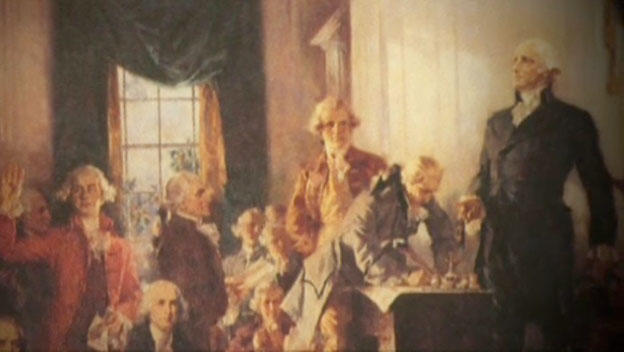Digital conditions, not competing intellectuals, will make it so.
Don’t Trade Judicial Supremacy for Executive Supremacy
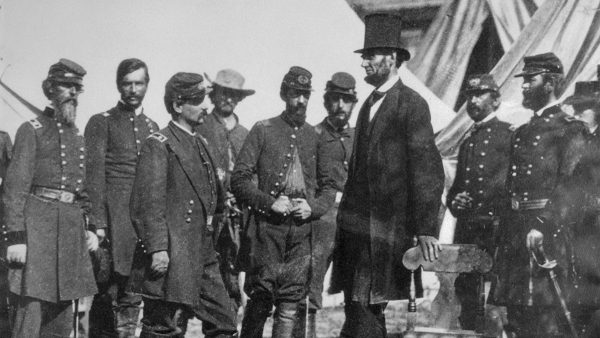
Separation of powers is a moral imperative.
Adrian Vermeule’s broadside against originalism in the Atlantic strikes at the heart of the modern conservative legal movement. Vermeule, the Ralph S. Tyler Professor at Harvard Law School, launches this attack as an avowed conservative, a Catholic convert, and a fierce pro-lifer.
It might seem like a losing game to criticize originalism at a moment when it seems ascendant. With two new members of the Supreme Court who openly describe themselves as originalists, along with hundreds of new appellate judges in the past three years, originalism’s future appears bright. Yet according to Vermeule, while originalists are strong in numbers, they are weak in argument. Vermeule proposes that now is the time for conservatives to consider a new jurisprudential era, casting off the shackles of proceduralist originalism in favor of his “common-good constitutionalism.”
Vermeule sees, or rather saw, originalism as instrumentally useful in its ability to stem the onrush of progressive court victories that characterized American jurisprudence in the 1960s and ’70s. The problem is that originalism is no longer inherently useful as an interpretive method. To Vermeule, “originalism has now outlived its utility, and has become an obstacle to the development of a robust, substantively conservative approach to constitutional law and interpretation.”
I am sympathetic to Vermeule insofar as he wishes to restore a reading of the Constitution which references moral judgments broadly aligned with the natural law but not found explicitly in the Constitution’s text. In his pursuit of this goal, however, Vermeule places the cart before the horse. He seeks to use the cover of natural law to justify his preference of stronger administrative rule as the primary means by which we realize the “common good.” Thankfully, an alternative exists: fidelity to the natural law as a guide to legitimate and illegitimate exercises of government power from proper actors within the constitutional scheme.
Vermeule is confident that while originalism has delivered conservatives from the wreckage of the Warren and Burger courts, it cannot now do any better than entrench what he calls “the maximum ideological programme of the ACLU.” What he means is that in the cases of ultimate import for the legal and political culture, the standard originalist position at best furnishes a “contentless inflexible command.” The originalism presently on offer has hollowed out our legal understanding of speech and religion—producing prudential “victories” but never demarcating crucial lines such as, for example, those between religion and irreligion or between speech and insults unworthy of protection.
Vermeule is quite correct that originalist dogma, if devoid of reference to substantive moral principles, cannot give a morally or logically coherent account of that which it seeks to vindicate. His alternative to this is a reading of the Constitution that views its procedural protections as a window into substantive commitments that an energetic executive ought to pursue for the “common good.” Vermeule’s common-good constitutionalism seeks a natural law justification, but prefers the consolidation of broad areas of legislative and judicial authority within the executive.
Vermeule’s Unification of Powers
Does Vermeule look to the American Founders or perhaps Lincoln as exemplars? No. The reason is that while Vermeule’s moral reading of the Constitution aligns with the vision of the American Founders, his view of the separation of powers does not.
Vermeule proposes an executive at the head of a muscular bureaucracy. The Founders and Lincoln envisioned an executive with ability and authority to act in the interest of the common good, but never with so broad a mandate as to relegate the other two branches to the role of subordinates. Therefore, even as Vermeule cites Aquinas at one point in his essay, his reading of the Constitution offers only a faint-hearted invocation of the natural law duties of different governmental actors.
It is not clear that Vermeule’s executive would tolerate even the faintest disagreement on constitutionality between the branches. The most famous instance of such interbranch disagreement is Lincoln’s argument that he, as the executive, was not bound to apply to future cases the ruling of the Court in Dred Scott v. Sandford (1857). Lincoln’s executive duty was only to ensure that the Court’s decision was carried out for the two litigants directly involved. In what is termed “departmentalism” today, Lincoln understood constitutionality as an ongoing conversation between the three branches.
As aptly stated by Russell Hittinger, Lincoln could only have reconciled swearing his oath to uphold the Constitution with his anti-slavery views if he understood that the Constitution was not made a pro-slavery document by the decision of the Court in Dred Scott. Lincoln expressed a view of the executive as being legitimately able to countermand, in application, a broad principle articulated by the Supreme Court.
Vermeule is supportive, as am I, of judges countering decisions of the other branches by reading substantive moral principles into the generalities of the Constitution. But ultimately Vermeule’s scheme subjugates wide swaths of legislative and judicial power to the executive with an enlarged bureaucracy that supplants interbranch deliberation.
“As for the structure and distribution of authority within government, common-good constitutionalism will favor a powerful presidency ruling over a powerful bureaucracy, the latter acting through principles of administrative law’s inner morality with a view to promoting solidarity and subsidiarity,” Vermeule writes. “The bureaucracy will be seen not as an enemy, but as the strong hand of legitimate rule.” Vermeule’s scheme does not derive legitimate exercise of executive power from just rule. Rather, it presupposes that just rule flows from “a ruler” to “subjects” by nature of the executive office. As Vermeule explains, “just authority in rulers can be exercised for the good of subjects, if necessary even against the subjects’ own perceptions of what is best for them—perceptions that may change over time anyway, as the law teaches, habituates, and re-forms them.”
It would be foolish to deny that law shapes culture: Vermeule is exactly correct when he says that it does. One need only look at attitudes toward integration in the years before the passage of the Civil Rights Act of 1964 and then in the years after its passage. In the former states of the Union, there was little change as attitudes remained overwhelmingly supportive. However, in the years after passage, there was marked shift toward the national mean in support of integration among the former states of the Confederacy.
Indeed, law is a powerful teacher for vast portions of the population who are moved only by an external command. The Left has used this sociological phenomenon to advance large parts of its agenda—on same-sex marriage and affirmative action, for example—to the teeth-gnashing of conservatives. Vermeule asks conservatives to have confidence in the substantive appeal of their positions and embrace the teaching function of law.
But conservatives ought to recoil from the broad brush with which Vermeule paints teaching through the laws. Note that the Civil Rights Act of 1964 was a legislative enactment, even with large deference to its enforcement by myriad new executive agencies. An executive may teach through administrative law, but those rules are necessarily narrower and may change from administration to administration. What Vermeule asks conservatives to do is elide the source of legal authority with the source of moral authority: to stop worrying and love the administrative state.
Again, in Vermeule’s ideal regime, the executive with its attendant bureaucracy subordinates the other branches to its mandate of securing the “common good.” In Vermeule’s candid choice of terminology throughout his essay, he signals how he understands law’s teaching function. Talk of “rulers” and “subjects” rings odd to the American ear, accustomed as we are to hearing about “citizens” and “elected representatives.” But this choice is intentional for Vermeule. He understands extending the “common good” as the prime directive of the only branch that is never out of session, the executive. Legal and moral authority inhere in the executive office and emanate outward via bureaucratic rules made legitimate by what he calls “administrative law’s inner morality,” citing a paper he co-wrote.
But to claim that “administrative law” possesses an “inner morality” is deeply misleading to say the least. Vermeule, in saying so, echoes legal scholar Lon Fuller. Fuller famously described law as requiring certain characteristics to be in moral harmony: “law must be general, publicly promulgated, prospective, clear and understandable, consistent, capable of being complied with, relatively stable, and administered faithfully.”
H.L.A. Hart, in a reply to Fuller, recognized that Fuller’s characteristics were not moral principles, but rather ways to maximize law’s efficiency. If Fuller was arguing that a law which meets standards such as generality ensures harmony with morality, Hart suggested Fuller’s scheme would endorse the morality of any purposive activity, including poisoning.
One should view Vermeule’s assurance that administrative law’s “inner morality” will secure its harmony with the natural law through the same skeptical lens. If one measures the moral rightness of administrative rule only by internal standards of efficiency and not by the external standards of the natural law, one has a recipe for the unjust consolidation of power in one branch without attendant checks by the other branches.
The Morality of the Separation of Powers
Natural law constitutionalism, therefore, draws its starkest contrast with Vermeule’s project in locating the source of moral authority for governmental actions. Harry Jaffa taught that the most illuminating way to understand the Constitution was as a secondary or companion document to the Declaration. The Constitution, just like administrative law, was never intended as the source of its own internal moral authority.
Figures such as Oliver Wendell Holmes and Antonin Scalia were never persuaded of this truth, despite the fact that the founders and Lincoln repeatedly invoked the Declaration and Constitution in tandem. In Lincoln’s metaphor, the Declaration was the apple of gold within the Constitution’s frame of silver.
The frame was made for the apple, not the apple for the frame. Onto the Declaration’s universal truths the Constitution grafts the separation of powers, reflecting other deep truths about the human condition and outlining how each branch may secure the Declaration’s promise.
Though often cited as a procedural protection for liberty, the separation of powers performs a moral function as well: it enshrines the Golden Rule in the American experiment of self-government. As Hadley Arkes has written:
What people don’t typically understand is that the logic of the separation of powers is a logic that renders operational what the philosophers call the universalizability principle or the categorical imperative: it puts the question of what the principle is behind one’s position and whether he would be willing to honor the same principle when it cuts against his interests.
The separation of powers is therefore best seen as a natural law check on the abuse of assertions in the name of the “common good.” Vermeule’s quest for consolidation of power within the momentary executive, even an executive guided by ideals for which conservatives might have sympathy, ignores that the Constitution itself provides ample means to secure “the common good.”
Charles Kesler has also recognized the separation of powers as a moral vehicle for protecting the people’s interests:
It was the separation of powers that made possible…identification of the Constitution with the awesome stature of the moral law, for separation of powers helped to keep the Constitution inviolate by elevating it above momentary popular whims. That is why political disputes among the branches of government are never decided by direct, extraconstitutional appeals to the people. In effect, the people have no existence outside of the Constitution, or more precisely, outside of the moral law embodied in the Constitution. It is only by elections and by political competition among the branches, therefore, taking place under the provisions of the Constitution, that the people’s rational will may be expressed.
Republican Statesmanship
The most charitable reading of Vermeule is that he seeks a vigilant executive who would command an enlarged bureaucracy tasked with securing the “common good.” But is this necessary, not to mention realistic? The closest analogue in American history would be Lincoln during wartime. Jaffa remarked in Crisis of the House Divided that“free government would be an absurdity did it require citizens all like Abraham Lincoln; yet it would be an impossibility if it could not from time to time find leaders of his understanding.” The same sentiment applies not only to citizens, but also to their leaders.
Vermeule assumes a Lincolnian figure ever-present in the executive. Certainly figures like Lincoln appear as leaders throughout history. Yet they are not the norm. A system of government that constantly requires Lincolnian statesmanship, prudence, and engagement would be, in Jaffa’s words, “absurd.” Even Lincoln himself never understood the executive office as requiring a muscular, semi-permanent figure. Lincoln considered the executive as, even in wartime, bounded by many measures of constitutional restraint and ultimate accountability to the electorate.
In his famous July 4, 1861 address at the onset of war with the Confederacy, Lincoln concludes with an appeal to members of Congress as office holders of a co-equal branch of government:
It was with the deepest regret that the Executive found the duty of employing the war power in defense of the Government forced upon him. He could but perform this duty or surrender the existence of the Government. No compromise by public servants could in this case be a cure; not that compromises are not often proper, but that no popular government can long survive a marked precedent that those who carry an election can only save the government from immediate destruction by giving up the main point upon which the people gave the election. The people themselves, and not their servants, can safely reverse their own deliberate decisions. As a private citizen the Executive could not have consented that these institutions shall perish; much less could he in betrayal of so vast and so sacred a trust as these free people had confided to him. He felt that he had no moral right to shrink, nor even to count the chances of his own life in what might follow. In full view of his great responsibility he has so far done what he has deemed his duty. You will now, according to your own judgment, perform yours. (emphasis added).
Lincoln provides a compelling argument for securing the common good of the Union. However, he understands the people as sovereign (though under the Constitution’s structural restraints) and members of Congress as co-equal in offering their own determination of the constitutionality of his actions.
Natural law constraints on the wielding of power by different actors in the constitutional order provide an alternative to Vermeule’s scheme. By adopting a departmentalist approach to constitutionality, conservative lawyers will abandon the flawed world of judicial supremacy we presently live in without trading it for Vermeule’s executive supremacy. Conservative lawyers ought to renew their faith in an originalism that encompasses a wide berth of natural law, and have confidence that judges, along with legislators and an executive, may make reference to ultimate values in constitutional deliberations.
This ongoing conversation between the branches is a conversation about the “common good,” as each branch interprets it. Vermeule may wish the conversation was expedited by executive determination. But the “common good” our system secures in its current form is more distilled and legitimate than what he proposes.
The American Mind presents a range of perspectives. Views are writers’ own and do not necessarily represent those of The Claremont Institute.
The American Mind is a publication of the Claremont Institute, a non-profit 501(c)(3) organization, dedicated to restoring the principles of the American Founding to their rightful, preeminent authority in our national life. Interested in supporting our work? Gifts to the Claremont Institute are tax-deductible.
Liberalism Is the Politics of Fear.
More than abstraction is at stake.
"Real Originalism has never been tried..."
In its effects, it is synonymous with liberalism.
A jurisprudence for all seasons—especially ours.


